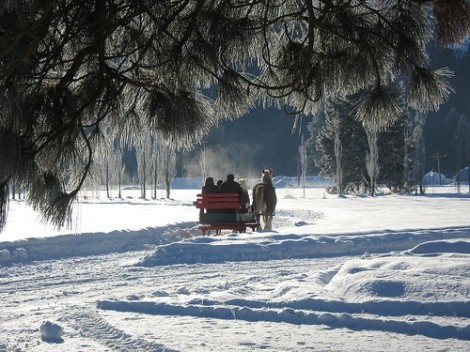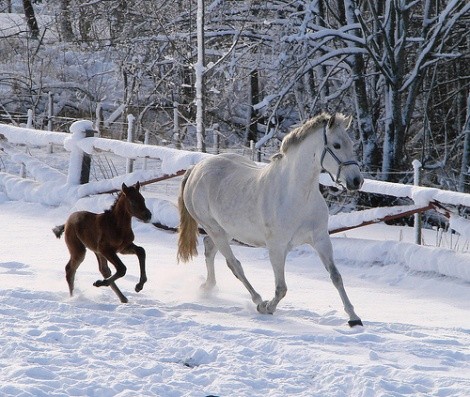You don’t have to hibernate to get through the winter months. With a few adjustments you can enjoy working with your horse year-round.

1. Give your horse plenty of forage/hay to offset the calories he’s burning to stay warm.
2. Make sure your horse has 24/7 access to unfrozen water. Water heaters are a must if your area freezes.
3. Give pastured horses access to a three-sided shelter for a break from the wind, rain or snow.
4. Make sure horses at the bottom of the herd hierarchy are allowed into shelters by the rest of the group.
5. If a horse becomes wet down to his skin during a cold storm, even the lightest wind can cause him to become dangerously chilled.
6. Keep yourself warm: Look for heat packs you can slip into gloves or use as toe warmers.
7. Barefoot or hoof boots with ice studs may all be hoof care options for your winter riding plans.
8. If you plan to pull your horse’s shoes for the winter, keep up on regular farrier appointments.
9. Spraying cooking oil on the soles of your barefoot horse may help keep snow from sticking during a ride—reapply often.
10. Horses with health problems or equine seniors may need extra care, including blanketing, in cold weather.
11. While it may be tempting to close up the barn to keep your horses warm, leave it open to encourage good ventilation and better respiratory health.
12. If your horse is shivering, he’s too cold. Take action, hypothermia is deadly.
13. Don’t use barn heaters—they’re a fire hazard.
14. Impaction colic is more common during winter: Make sure your horses are drinking for good digestive function.
15. If you live in a warmer region where mud is your primary winter concern, watch turnout footing. Sandy soil is much better than slippery, gooey mud.
16. Use a feeding system that prevents hay from becoming trampled and wet. There are lots of different feeders out there to help with keeping the majority of hay off the ground.
17. Offer stabled horses plenty of daily exercise to prevent explosive behavior that leads to injury.

18. Keep horses off ice. Frozen ponds and streams, ice patches in turnouts and black ice on roads can all lead to disaster.
19. Cat litter thrown on slick surfaces can help prevent slipping.
20. Routinely groom your horse to check for skin maladies, wounds and weight loss.
21. Wash horse blankets regularly to avoid equine skin problems.
22. Warm your bit to make wintertime bridling a more pleasant experience.
23. Stock your hay.You don’t want to run out during a nor’easter.
24. Keep your equine first-aid kit well-equipped. If an emergency arises when roads are closed, your veterinarian might not make farm/house calls.
25. Check blanket fit. An ill-fitting blanket can cause rubs. A horse can also get dangerously tangled in a too-big blanket.
26. Leave mane, tail, fetlock feathers, beard and other guard hairs au naturel for extra protection against the elements.
27. Consider a partial or full body clip for your riding horse to make cooling-out time go faster (but he’ll have to be properly blanketed).
28. Select an appropriate blanket weight that will keep your horse warm without overheating him.
29. Insulate your water pipes in and around the barn to prevent freezing.
30. Remember, most horses fare better in cooler temperatures than in summer heat.
Take advantage of this and enjoy your winter rides.
How do you enjoy winter with your horses?
Nancy Fredrick

EasyCare Office Manager
As the office manager, I make sure the general operations of the organization run smoothly and seamlessly from A to Z. I have been on the EasyCare team since 2001 and have first hand product knowledge as my horses are barefoot and booted.




